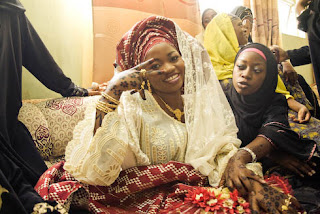The tribe makes up 29% of Nigerians that live mainy in the Northern part of Nigeria.
They mostly occupy the towns and villages of the Northern parts including Kano, Kaduna, Biram, Jos, Lafia, Maiduguri, Damaturu, Dutse, Gombe, Suleja, Gusau, Jalingo, Jebba, Lafia, Katsina, Abuja, Kano, Sokoto, Bauchi, Birnin, Kebbi, Makurdi, Yola, Zaria etc.
The Hausa language originated and forms part of the Chadic family of languages which is similar but distantly associated to Hebrew and Arabic
I'm sure you're loving my history lessons.... 😄
The Hausa Traditional Wedding Ceremony:
Hausa Traditional marriages are primarily based on Islamic rites, the nikkhai must precede all wedding ceremony. The culturally rich events tend to last about a week, starting with an wedding fatiha and ending with the main wedding reception.
A marriage proposal is the first step to a Traditional Hausa Wedding. It is tendered to the bride’s family and they have accepted. Once they have accepted, according to cultural rights, the groom’s family needs to provide a number of items to the bride, this is called “Kayan Zance”. The items typically include:
- Household items e.g. cookware, furniture..
- Fabrics
- Scarves
- Perfumes
- Beauty products
- Underwear
- Shoes
- Cash (Kudin Gaisuwa)
Based on how affluent the groom's family is, they may be asked to provide a house for the couple while the bride’s family has full responsibility of furnishing the house, especially her room, living room and the kitchen. All these are done before prior the actual Wedding Ceremony
DAURIN AURE: This is the religious ceremony. It is usually hosted and attended by the men in both families. Wedding vows are exchanged but done differently. In the Hausa culture a representative from the groom and bride’s family usually does exchange of vows in the presence of a religious leader and many invited guests. Prayers are offered to the newly wedded couple and celebration continues. This is the most significant event of the entire wedding ceremony.
KAMUN AMARIYA: This is one of the oldest events in the Hausa wedding ceremony. “Kamu” means ''catch the bride''. The groom’s family and friends go and negotiate with the bride’s friends for her release to them. They are demonstrating that have come for their bride and they are wiling to pay any price to have her. This is a really fun event and negotiation may take up to 30 minutes followed by a fun and lavish reception.
WUNI/SA LALLE: The event is strictly for the ladies. This is when the bride gets to spend the last day as a single lady with her friends and female members of her family, in her father’s house. A mixture of henna is made and used to make beautifully designs on the bride’s hands, palms and legs. Her friends and family may also get henna designs on their hands but not as elaborate as the bride. Henna is used to make bring out the beauty of the bride.
KAI AMARIYA: This part is when family and friends chaperon the bride to her matrimonial home to be welcomed, received and accommodated by her inlaws. After which prayers and advice from her family is given. This is not the end of events in the Hausa Traditional Marriage; there is usually a reception to end the entire wedding ceremony. This includes, food, music and entertainment. After the storm, in some parts of Hausa land, “Sayan baki” takes place In some parts of hausa land the “sayan baki” takes place. This is a negotiation between the groom’s men and the bridesmaids, debating on the amount to be paid before the bride speaks to her groom
This Hausa Culture is so fascinating, it appears to be very family orientated.
Please Follow, Like Comment and Share!

















